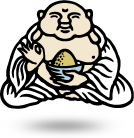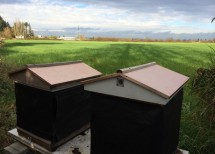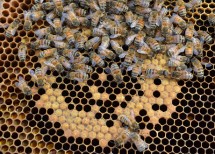The Booze and The Bees
Posted by Sylvia Rigakis on Friday, March 14th, 2014Tags for this Article: bees, honey, infused, Scotch
Growing up in North Vancouver, Michael Cober recalls being fascinated by watching bees working in the hives his father kept. “My love of beekeeping is about not just getting outside and being in nature but participating in it,” explains the Vancouver designer. “Not just walking in the forest but looking closer and immersing yourself in something else. It’s also about my family’s history.”
Inspired by a desire to share that legacy with his nine-year-old son Silas, three years ago Michael took a beekeeping course and bought two hives that he was able to set up in a farmer’s field close to his house. That decision quickly gave rise to an idea for a new business venture that would bring Cober and his father to share their common passion. Kober & Sons, The Honey Rustlers was founded by Michael and his father and now produces limited edition scotch-infused honey and simple syrup.
In addition to the hives Cober has close to home, Michael Senior keeps four hives up in 100 Mile House. Because the bees’ food supply is different in each location, it provides them with different varieties and flavours of honey. It was the desire to explore the subtleties of taste within the honey that prompted Cober to begin infusing honey with scotch. “It’s interesting how certain types of honey are suited to specific types of Scotch—it’s about finding the combination that compliments both.”
Concentrating on two different products Kober & Sons, The Honey Rustlers have developed “Standard Scotch Blend” a scotch-infused honey and “Not So Simple Syrup” a scotch-infused honey syrup that’s a great replacement for simple syrup and adds a richer sweetness and taste to any cocktail.
The scotch is evaporated to leave it with its flavours and not overpower or thin out the honey too much. “We’ve been going through a process, finding the perfect scotch to infuse with the honeys that we have,” notes Cober. “For instance you can’t use a really smoky scotch with a floral honey.”
Perfect for scotch lovers and skeptics alike, the first taste is sweet then the flavours of the scotch linger on your palette. The honey is great used on anything from the sweet – such as ice cream—to the savoury —such as salmon. I’ve already enjoyed it on sharp cheese and have plans to experiment by putting it in my baklava.
Available in limited editions you can find out more about these products on the Kober & Sons, The Honey Rustlers Facebook page.
Talking with Michael I learned a lot of fascinating bee facts such as:
- Bees store nectar in a second stomach.
- Pollen is gathered and collected in pollen sacs on their legs. Each hive can easily contain 50,000 – 60,000 bees.
- A single hive can produce anywhere from 0 – 150lbs of honey.
- Nectar is collected every summer and turned into honey in order to survive the winter months.
- Bees collect pollen, propolis, and water. Bees produce Royal Jelly, Honey, Wax, & Venom.
- Bees are the only insect to produce food that is eaten by humans.
- Three different types of bees in a hive: Queen, Workers, and Drones.
- There is one queen per hive who can lay up to 2,000 eggs per day
- Drones are male bees whose only purpose is to mate with a queen (Upon mating with a queen—which causes the Drones penis to be torn from his body, he dies). They do not collect pollen or nectar, they do not tend to the brood and are usually kicked out of the hive before winter—bees cannot survive more than 24 hours away from their hive.
- Workers are infertile females, the smallest and hardest working members of a hive.
- Worker bees spend the first part of their life in the hive acting as ‘nurse’ bees, drawing out comb from wax excreted from their abdomen, tending to laid eggs, and cleaning and maintaining the hive structure.
- The bees in a hive can choose to kill a queen if she is sick or unproductive. This is usually done with what is called the cuddle of death—the worker bees gather tightly around the queen smothering her and killing her from overheating (hyperthermia).
- When a queen lays an egg the larvae is fed Royal Jelly for 2 – 3 days, if the larvae is to be raised as a new queen (to replace an old queen or two allow the existing queen to swarm) then the diet of Royal Jelly will continue for the rest of her life.
- A queen who’s diet consists of only Royal Jelly can live up to 7 years, while a worker bee who only receives Royal Jelly for 2 – 3 days lives for up to 6 weeks during the summer and 4 – 9 months during the winter.
- Royal Jelly is considered to be a very healthy substance and is believed to be effective in fighting against cancer.
- Pollen comes in a variety of colours and by observing the bees as they enter the hive or looking into the honeycomb cells one can speculate on the type of flower the pollen is originating from.
- The flavour of honey is determined by the nectar collected from various flowers. The more dominant the presence of a nectar producing plant the more influence it will have on the flavour of the honey.




Posted on March 14th, 2014
foodists says:
Do you like #scotch? Read more about Kober & Sons, The Honey Rustlers limited edition #BC scotch infused #honey. ^sr http://t.co/6TUZGclcYp
Posted on March 14th, 2014
sylvia_maxwell says:
Read my latest @foodists article on Kober & Sons, The Honey Rustlers limited edition #BC #scotch infused #honey. http://t.co/crfNbRwYIJ
Posted on March 14th, 2014
4185avon says:
RT @foodists: Do you like #scotch? Read more about Kober & Sons, The Honey Rustlers limited edition #BC scotch infused #honey. ^sr http://t…
Posted on March 14th, 2014
mikecober says:
RT @foodists: Do you like #scotch? Read more about Kober & Sons, The Honey Rustlers limited edition #BC scotch infused #honey. ^sr http://t…
Posted on March 14th, 2014
foodists says:
The Booze and the Bees. Introducing Kober & Sons, The Honey Rustlers. http://t.co/JK9IAAaynM
Posted on March 18th, 2014
RurOpp says:
The Booze and the #Bees | via @foodists http://t.co/VYQCx4u5u2 #apiculture #honeybees